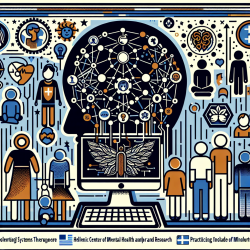Introduction
The role of fathers in the rehabilitation of children with disabilities is often overshadowed by the more documented involvement of mothers. A recent study conducted in the United Arab Emirates (UAE) sheds light on this crucial aspect, emphasizing the significant impact fathers can have on their children's development. This blog aims to provide practitioners with insights from the study to enhance their skills and encourage further research.
Study Overview
The study titled "Nationwide study of fathers’ involvement in the rehabilitation of children with disabilities in the United Arab Emirates" involved 1,027 parents, including 469 fathers. It utilized the revised Fathers’ Involvement in Development and Rehabilitation Scale to assess paternal involvement across three domains: support, attitudes, and participation in training. The results indicated a high level of involvement from fathers, particularly in terms of attitudes and support.
Key Findings
- Fathers rated themselves highly on attitudes and support towards their children with disabilities compared to mothers.
- Parental type significantly moderated the relationship between the support needs of children and paternal support.
- The study suggests targeted training programs to enable fathers to better support their children's development.
Implications for Practitioners
Practitioners can leverage these findings to foster greater paternal involvement in rehabilitation processes. Here are some actionable steps:
- Encourage Training: Develop training programs specifically for fathers to enhance their skills in supporting children with disabilities.
- Promote Positive Attitudes: Work with fathers to cultivate positive attitudes towards their children, which can significantly impact their involvement and support.
- Facilitate Support Networks: Create support groups for fathers to share experiences and strategies for effective involvement.
Encouraging Further Research
The study opens avenues for further research into the role of fathers in different cultural contexts and their impact on children's rehabilitation outcomes. Practitioners are encouraged to explore these areas to contribute to a more comprehensive understanding of parental involvement.
Conclusion
Fathers play a pivotal role in the rehabilitation of children with disabilities, as evidenced by the UAE study. By implementing targeted training and fostering positive attitudes, practitioners can enhance paternal involvement, leading to better outcomes for children. To delve deeper into the study, you can access the original research paper here.










